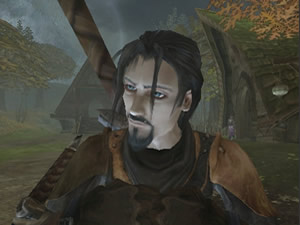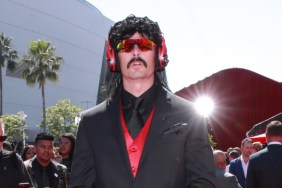Some fairy tales do come true.
Spend one night watching network television and it’s clear that the requirements
for fame have reached an all-time low. Actual talent has taken a backseat to
such skill sets as eating bugs, redecorating a house or getting a facelift. In
turn, fame has become as accessible and meaningless as the deluge of reality
shows that pimp it.
But these shows highlight the fact that fame has never been reserved for those who technically deserve it, a point often lost in the countless films and video games that insist on featuring a goody-two-shoes hero who gains renown by saving the world from destruction. Sometimes, people become famous through lying, cheating, stealing, and generally behaving badly.
And that’s just the way game design legend Peter Molyneux likes it.
Over the past decade, Molyneux has spearheaded software that turns concepts of ethics and morality upside down, allowing you to play a devilish dungeon master in Dungeon
Keeper and nourishing your inner god complex in Black & White. But neither of these PC giants touches on what it means to be a hero, the basis for the highly-anticipated upcoming Xbox monster, Fable.
I first saw Fable at E3 2000 when it was called Project
Ego, and from that day on have tried to not obsess over its development.
This turned out to be a wise decision, as the release date has been changed so
often that industry insiders starting joking that the game itself was little
more than a fairy tale. Besides, I just didn’t see much use in reporting on all
sorts of gameplay features that would likely be tweaked or even dropped altogether
when the game finally hits your hands.
Well, it looks like this drawn-out story is finally coming to an end. The game
is slated for actual release in Summer ’04, which means that it’s finally
ripe enough to warrant a closer inspection. Having been afforded such an opportunity
at the recent GDC convention, let me go on record saying that it was well worth
the wait: Fable might well be the coolest game the master craftsman has dreamt
up yet.
From afar, the game seems like a somewhat typical role-playing game. You start off playing as a child in the land of Albion, though soon enough you’ll grow into a young man pulled into a guild that trains strapping lads like yourself to become heroes. Exactly what kind of hero you become remains to be seen, however, and this is where Fable distinguishes itself from just about any other console RPG you’ve ever played.
Like the epic Morrowind, Fable features
a central plot surrounded by an enormous, living, breathing world filled with
warriors, monsters, traders, families, beggars, pickers, grinners, lovers, sinners,
and even those who play their music in the sun – bards. Your task, should you
choose to accept it, is to go from an unknown face in the crowd to the most famous
mug in the land. How you accomplish this feat, however, is very much up to you.
Every action has a reaction – save a damsel in distress and you’ll gain ‘good’ points
and the fame that goes along with it; kill the damsel and steal her fancy ring
instead and you’ll gain ‘evil’ points…as well as a reputation that precedes you.
One way in which you can affect this immediately is found through Fable‘s
Expression system. Heroes don’t just wander around smiling like morons all the
time, so you can opt to wear a sneer or a grin, bust out an evil laugh or flip
someone the finger. Over the course of the game you’ll learn tons of these gestures
and expressions, each paving the way for a new reaction from the hordes of NPCs
with whom you’ll interact.
Taking another cue from Morrowind, Fable presents
a huge fantasy world but does not enforce strict rules as to how you should explore
it. This is made most obvious in the lack of a class system. You don’t choose
or build a wizard or a fighter – you
simply play the game and decide along the way how you want to tackle it. You
could spend experience points on strength and weapon skills or the arcane arts…or,
most likely, a mixture of the two. Burl up on offensive magic at the cost of
defense, or go hardcore tank with heavy weapons, big muscles and no brains. It’s
really your call.
Whether swinging swords or slinging spells, combat in Fable takes
place in real-time. It’s very much an action affair similar in function to the
lock-on fighting found in the Zelda games, which means some gamers will find
marginal success just hacking and slashing. But Fable comes
complete with combo multipliers that will increase the amount of XP you earn
in battle, rewarding smart play over button-mashing.
And just in case you find the game too easy, Fable includes one of the coolest concepts in a RPG to date: the Boasting Platform. Before undertaking a mission, you can stand on the platform and announce to all passers-by that you will attempt to perform the task at hand without using a shield, or casting spells, or, if the mood takes you, without wearing any pants. The more difficult the boast, the more XP and fame you’ll receive if you complete the mission. It’s a great way to integrate difficulty levels seamlessly.
In a sense, Fable is the RPG version of Black & White.
Your deeds and fame color your experience, from the reactions you’ll get from
NPCs to your actual look. That’s right – your look will change depending on how
you behave. Everyone starts off with the same little avatar, but your play style
will dictate if your hero is bright and shiny or dark and dirty, whether he grows
horns or wears a halo. This is even affected by your play style. Focus on melee
fighting and you’ll sprout a few inches along with some macho hair in strange
places; concentrate on casting spells and you might find your hair whitening
a bit as your body takes a backseat to your mind. Spend too much time sneaking
about at night and your skin will be stark white, while those who romp around
in the sun sport a nice, even tan. Very cool.
Likewise, your actions will dictate how the world treats you. If you spend time
hunting traders to plunder their loot, you might wind up paying exorbitant
amounts of cash for items that are suddenly harder to find. Piss off a shopkeeper
and he might refuse to deal with you at all. If you become too famous and well-liked,
you might find yourself being followed around by annoying little kids. You
can even get married, buy a house and settle down, though it’s a bit unclear
as to exactly how that all works. Regardless, there’s
no handy ‘undo
horrible decision’ button; like in real-life, you’ll
have to learn to live with the consequences of your actions.
Despite its open-ended feel, Fable will feature a linear, arcing
story that players will eventually be nudged into following. So yes, the game
will end and you’ll either win or lose or end up somewhere in between. However,
the design of Fable inherently allows for pretty high replayability.
Too much of a wussy, white light wizard the first time through? Then try it a
second time as a mean, hulking, axe-wielding maniac! It’s all about being famous,
not friendly.
And if the hype machine is even vaguely right about Fable, then
fame is certainly in the stars for this grandiose game. It makes big promises
and takes big chances. Will it be a beloved hero or a reviled villain? I suppose
that’s ultimately for you to decide when it hits shelves later this year.







